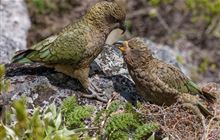DOC concerned about captive kea deaths
Archived content: This media release was accurate on the date of publication.
Introduction
The death of two privately-held captive kea after a routine health check over the weekend is concerning and DOC would like to determine the cause of their deaths.Date: 07 August 2018
DOC learned yesterday that two kea, held by a Darfield family, had died the day after a DOC senior ranger and experienced wildlife veterinarian undertook a health check last Friday as part of a plan to rehome the birds.
DOC Operations Manager for the Mahaanui district, Andy Thompson, says that following the health check, which included observing the birds’ behaviour, weighing them, taking swabs, a blood sample and removing a feather, both birds were alert and did not appear distressed.
“The death of the kea was unexpected and deeply concerning and we offer our sympathy to Ron Stewart and his family.
“Results from some of the tests show the birds were fit and healthy and there was nothing to indicate this would occur. We’d like to send the birds to Massey University for necropsy to ascertain the cause of death.
“We’ve been working with Ron Stewart towards the rehoming of their kea for several years as their facilities don’t meet the minimum standards for holding kea.
“We acknowledge that people get very attached to kea they have cared for and their removal can be very upsetting.
“It’s very unusual for captive kea to die from a routine health check and we wouldn’t have carried this out if we had thought it would put the birds at risk.”
The health assessment of the two birds on Friday has been carried out on many other captive kea prior to moving them, with no ill effect.
The entire procedure took about 35 minutes per bird. After the health assessment procedure both birds were alert and did not appear to be distressed.
Kea are highly intelligent and active birds that need large aviaries so they can fly around, and suitable enrichment activities to keep them healthy and mentally stimulated, says Andy Thompson.
“The holding of such a long-lived and intelligent species in facilities that are too small and don’t meet the standards for mental stimulation is not acceptable.”
The minimum size for an aviary for two adult kea is 180 m3 but the aviary the birds were housed in was 24 m3.
DOC has been working to improve the outcomes for captive kea since 2012 by removing kea from premises that don’t meet the minimum husbandry standards and taking them to large professionally-run institutions to join existing kea flocks.
Since this time DOC has rehoused about 15 birds from nine facilities to new homes such as the Wellington Zoo.
Before kea are moved they need to have a thorough health assessment to ensure they don’t have viruses or diseases that could be transferred to other birds. Such health screening is a standard approach for all movements of captive birds and is in accordance with DOC’s wildlife health protocols.
Contact
For media enquiries contact:
Email: media@doc.govt.nz

